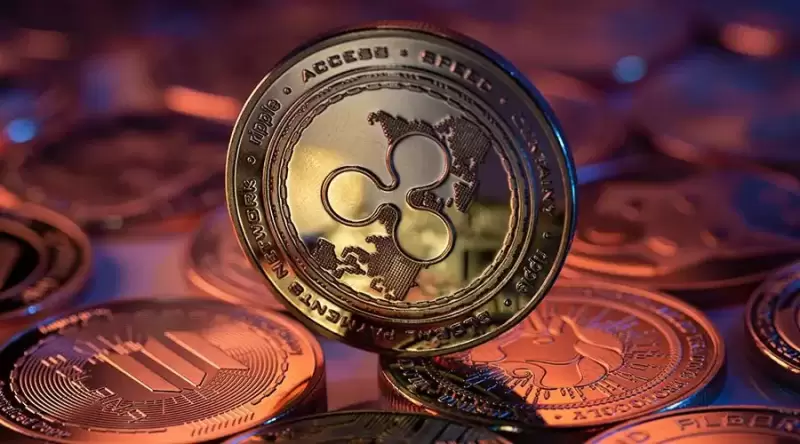 |
|
 |
|
 |
|
 |
|
 |
|
 |
|
 |
|
 |
|
 |
|
 |
|
 |
|
 |
|
 |
|
 |
|
 |
|
Cryptocurrency News Articles
Investor litigation around cryptocurrency won't disappear just because the US Securities and Exchange Commission has been dropping Biden administration enforcement actions.
Mar 31, 2025 at 05:00 pm
Buoyed by campaign support from the industry, President Donald Trump returned to office pledging to make the US “the crypto capital of the world,†issuing an executive order creating a strategic bitcoin reserve and abandoning the prior administration’s efforts to regulate by enforcement the virtual currencies as though they were traditional securities.

Investor litigation around cryptocurrency won’t disappear just because the US Securities and Exchange Commission has been dropping Biden administration enforcement actions.
Buoyed by campaign support from the industry, President Donald Trump returned to office this week pledging to make the US “the crypto capital of the world,” issuing an executive order creating a strategic bitcoin reserve and abandoning the prior administration’s efforts to regulate by enforcement the virtual currencies as though they were traditional securities.
He also pardoned Ross Ulbricht, founder of the drug-trafficking site known as Silk Road, where virtual currency was the coin of the realm. He had been serving a life sentence following his 2015 conviction for trafficking and other crimes.
But even as Trump’s SEC ends suits against Coinbase Global Inc, Binance Holdings Ltd, Ripple Labs Inc—in which a court had ruled its token was a security when sold to institutional investors, but not to the general public, and others, privately-filed lawsuits against them have continued.
And suits against promoters of other digital assets, such as the “Hawk Tuah” and “Peanut the Squirrel” memecoins, are ongoing despite a signal that the SEC won’t consider most securities.
Private plaintiffs and state attorneys general can and likely will still pursue claims—perhaps even more so if the SEC backs off enforcement entirely and bad actors emerge, lawyers said.
Nothing’s changed legally in determining what is a security—it’s still the Howey test outlined by the US Supreme Court in 1946, said Sean Masson, a partner at Scott+Scott Attorneys at Law LLP. Even if the federal securities route for crypto accountability gets nixed, there are other ways, such as state securities laws, consumer laws, or just plain fraud, he said.
“There’s still a lot of arrows left in the plaintiffs bar’s quiver,” Masson said. Much of the litigation surrounding crypto was pretty far along when the administration changed, he said. The number of new cases arising depends on the number of new digital asset projects, he said, while the SEC’s task force explores a “regulatory framework” for crypto.
The SEC will still pursue securities fraud claims, said Davis Polk & Wardwell LLP partner Rob Cohen among multiple attorneys Bloomberg Law spoke to. The idea that federal officers aren’t going to recommend regulating crypto is false—the query is by how much and whom, said Masson.
And, acting SEC Chairman Mark Uyeda has said it’s possible some digital assets will be defined as securities. The SEC, in an email, declined to comment for this story.
Trump’s pick to lead the agency, Paul Atkins, said in a public Senate committee hearing on March 27 that providing a “firm regulatory foundation” for crypto assets would be a “top priority.” Atkins himself reported having up to $5 million in crypto-related investments in ethics disclosures publicized days earlier.
There’s such a wide range of digital assets, attorneys said—from stablecoins, whose values are pegged to other currencies, to memecoins, digital tokens depicted with an animated character or animal, that can quickly gain value—that might draw different regulation or recommendations.
One of those lawyers, Stubbs Alderton & Markiles LLP partner Neil Elan, said “even if a ‘Hawk Tuah’ coin or the newest ‘Libra’ coin or the ‘Melania’ coin or the ‘Trump’ coin is not deemed a security, it does not mean that the operators or offerors are free to commit fraud, make materially false statements, or otherwise act improperly.” The prospect of liability remains, he said.
Consumer protection is a wide body of law, said Max Burwick, founder and senior managing partner at Burwick Law. His firm leads a series of suits involving the Hawk Tuah, Libra, and other memecoins.
“Although there is a supposed lack of regulatory clarity, an active plaintiff’s bar stands as a check on bad actors, and can positively impact the market,” he said.
Just as plaintiffs’ attorneys remain a resource for aggrieved investors, state attorneys general haven’t paused as state officials of the opposing party of the administration typically tend to increase activity during the president’s term.
There may be “an increase in state regulatory activity in the space, which has been more active in the last few years (both in enforcement activity as well as digital asset legislation),” said, Mitzi Chang, co-chair of Goodwin Procter LLP’s FinTech and Digital Currency & Blockchain practices. The office of California Attorney General Rob Bonta this month said it would continue protecting consumers from “crypto confidence scams.” California’s Department of Justice shuttered 42 crypto scam sites that drew at least $6.5 million from individuals in 2024.
Illinois’ too said it would continue. “As we review the SEC’s decisions and their impact on the marketplace, we urge consumers to be cautious when purchasing or using cryptocurrencies,” a spokesperson for Attorney General Kwame Raoul’s office
Disclaimer:info@kdj.com
The information provided is not trading advice. kdj.com does not assume any responsibility for any investments made based on the information provided in this article. Cryptocurrencies are highly volatile and it is highly recommended that you invest with caution after thorough research!
If you believe that the content used on this website infringes your copyright, please contact us immediately (info@kdj.com) and we will delete it promptly.
-

- Title: According to the National Security Bureau, China has spread misinformation about Taiwan on the island in order to share generative artificial intelligence (AI).
- Apr 09, 2025 at 03:40 am
- In recent years, Taiwan Beijing has also accused of increasing its influence operations to enforce trade restrictions and to carry out military exercises near the island - all efforts to put Taiwan under pressure, to accept China's sovereign claims.
-

-

- Tether Plans to Launch a New Stablecoin for the U.S. Market if Cryptocurrency Legislation Passes
- Apr 09, 2025 at 03:35 am
- Tether, the world's largest stablecoin issuer to date, has stated that if cryptocurrency legislation is passed by Congress this year, it plans to create a new stablecoin for the U.S. market.
-

-

-

-

-

-




























































